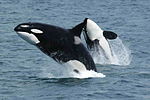Latimeria is a rare genus of fish which contains the two only living species of coelacanth. It includes two extant species: the West Indian Ocean coelacanth...
27 KB (2,988 words) - 08:14, 15 October 2024
by only two extant marine species in the genus Latimeria: the West Indian Ocean coelacanth (Latimeria chalumnae), primarily found near the Comoro Islands...
73 KB (6,384 words) - 21:46, 20 December 2024
West Indian Ocean coelacanth (redirect from Latimeria chalumnae)
The West Indian Ocean coelacanth (Latimeria chalumnae) (sometimes known as gombessa, African coelacanth, or simply coelacanth) is a crossopterygian, one...
21 KB (2,051 words) - 21:08, 20 December 2024
Indonesian coelacanth (redirect from Latimeria menadoensis)
The Indonesian coelacanth (Latimeria menadoensis, Indonesian: raja laut), also called Sulawesi coelacanth, is one of two living species of coelacanth...
27 KB (3,178 words) - 06:12, 4 December 2024
lineage of lobe-finned fish. It contains two extant species in the genus Latimeria, found in deep waters off the coasts of southern Africa and east-central...
6 KB (357 words) - 07:43, 18 November 2024
genitive case. For example, the name of the coelacanth, Latimeria chalumnae which means "Latimeria of Chalumna", is a reference to the area near the mouth...
5 KB (702 words) - 05:43, 19 May 2024
described, about a century before the discovery of the extant coelacanth Latimeria. The order Coelacanthiformes is named after it. The only definitive species...
7 KB (620 words) - 12:33, 14 October 2024
Hodgson. Rather than a person, the noun may be related to a place, as with Latimeria chalumnae, meaning "of the Chalumna River". Another use of genitive nouns...
58 KB (6,684 words) - 07:37, 7 December 2024
years ago come alive again". Smith would give it the scientific name Latimeria chalumnae after his friend and the Chalumna River, where it was found...
7 KB (730 words) - 06:48, 26 November 2024
Indian Ocean coelacanth (Latimeria chalumnae) and the Indonesian coelacanth (Latimeria menadoensis), are found in the genus Latimeria. Coelacanths are thought...
91 KB (7,814 words) - 14:15, 18 December 2024
T6149A15362335.en. Retrieved 11 November 2021. Musick, J.A. (2000). "Latimeria chalumnae". IUCN Red List of Threatened Species. 2000: e.T11375A3274618...
102 KB (10,209 words) - 18:49, 1 December 2024
Coelacanthiformes, of which the genus Latimeria was found to be extant in 1938. About that there is little debate – however, whether Latimeria resembles early members...
48 KB (4,995 words) - 14:05, 11 December 2024
"A comparative study of piscine defense: The scales of Arapaima gigas, Latimeria chalumnae and Atractosteus spatula". Journal of the Mechanical Behavior...
25 KB (2,636 words) - 00:23, 27 November 2024
Permian, and finally dying out during the Jurassic. The modern-day genus Latimeria is often erroneously thought to be in this family, when, in fact, it is...
1 KB (68 words) - 17:31, 14 October 2024
William E.; Hetherington, Thomas E. (28 May 1982). "The Rostal Organ of Latimeria chalumnae: Morphological Evidence of an Electroreceptive Function". Copeia...
26 KB (2,161 words) - 21:32, 5 December 2024
lapillus in the utriculus. In dipnoans there are only two otoliths and in Latimeria there is only one. However, most of the above synapomorphies can ultimately...
6 KB (458 words) - 10:56, 26 October 2024
documents. Anatomie de Latimeria chalumnae, 1958–1978; 3 volumes (with Jean Anthony; Daniel Robineau) – Anatomy of Latimeria chalumnae. BnF Notice nécrologique...
5 KB (484 words) - 23:29, 14 December 2024
marine Latimeriidae, which contains the living coelacanths of the genus Latimeria, were also present in the Jurassic, having originated in the Triassic...
234 KB (25,310 words) - 16:39, 19 December 2024
direction about 277 million years ago and has a brain resembling that of the Latimeria). The dentition of lungfish is different from that of any other vertebrate...
40 KB (3,361 words) - 22:04, 26 November 2024
PMID 14738502. Locket NA (July 1974). "The choroidal tapetum lucidum of Latimeria chalumnae". Proceedings of the Royal Society B. 186 (84): 281–290. Bibcode:1974RSPSB...
19 KB (2,094 words) - 13:19, 2 December 2024
trait they share with the rest of the Clupeocephala and possibly the Latimeria (NOS2 and NOS3 have also yet to be detected in Elopomorpha). Sparks, John...
13 KB (977 words) - 09:05, 10 June 2024
Griffith, R. W (1980). "Chemistry of the Body Fluids of the Coelacanth, Latimeria chalumnae". Proceedings of the Royal Society B: Biological Sciences. 208...
143 KB (14,309 words) - 06:21, 21 December 2024
Early Triassic, just after the Great Dying. Coelacanths of the genus Latimeria still live today in the open oceans and retained many primordial features...
37 KB (2,775 words) - 08:47, 16 December 2024
in the Phanerozoic; coelacanths still live today in the oceans (genus Latimeria). The Rhipidistians, whose ancestors probably lived in estuaries, migrated...
47 KB (4,560 words) - 10:30, 13 December 2024
the Latimeriidae (which contains the living coelacanths of the genus Latimeria) by the presence of ossified ribs, a coarse rugose texture on the dermatocranium...
6 KB (448 words) - 05:59, 7 November 2024
section of the written article explains that: "Since this chance sighting, Latimeria chalumnae have been found in several pockets in and around the Indian...
11 KB (1,139 words) - 06:17, 11 July 2023
Chemistry Professor at Rhodes University, publishes his description of Latimeria chalumnae The Making of Territorial Apartheid : The Case of East London's...
39 KB (3,618 words) - 12:37, 9 December 2024
fossils from 2 to 90 million years ago, rediscovered in 1994. Coelacanth (Latimeria), a member of a subclass (Actinistia) thought to have gone extinct 66 million...
51 KB (5,940 words) - 07:26, 21 December 2024
coelacanth. The average weight of the living West Indian Ocean coelacanth, (Latimeria chalumnae), is 80 kg (180 lb), and they can reach up to 2 m (6.6 ft) in...
71 KB (8,339 words) - 06:47, 27 November 2024


























